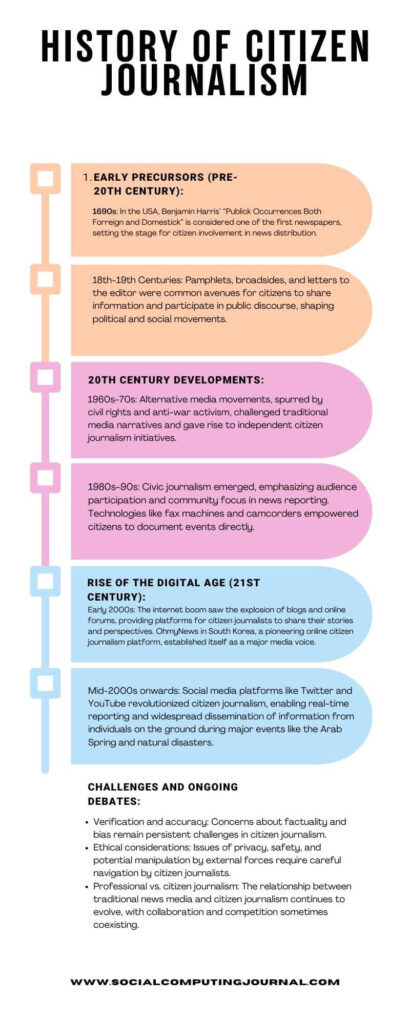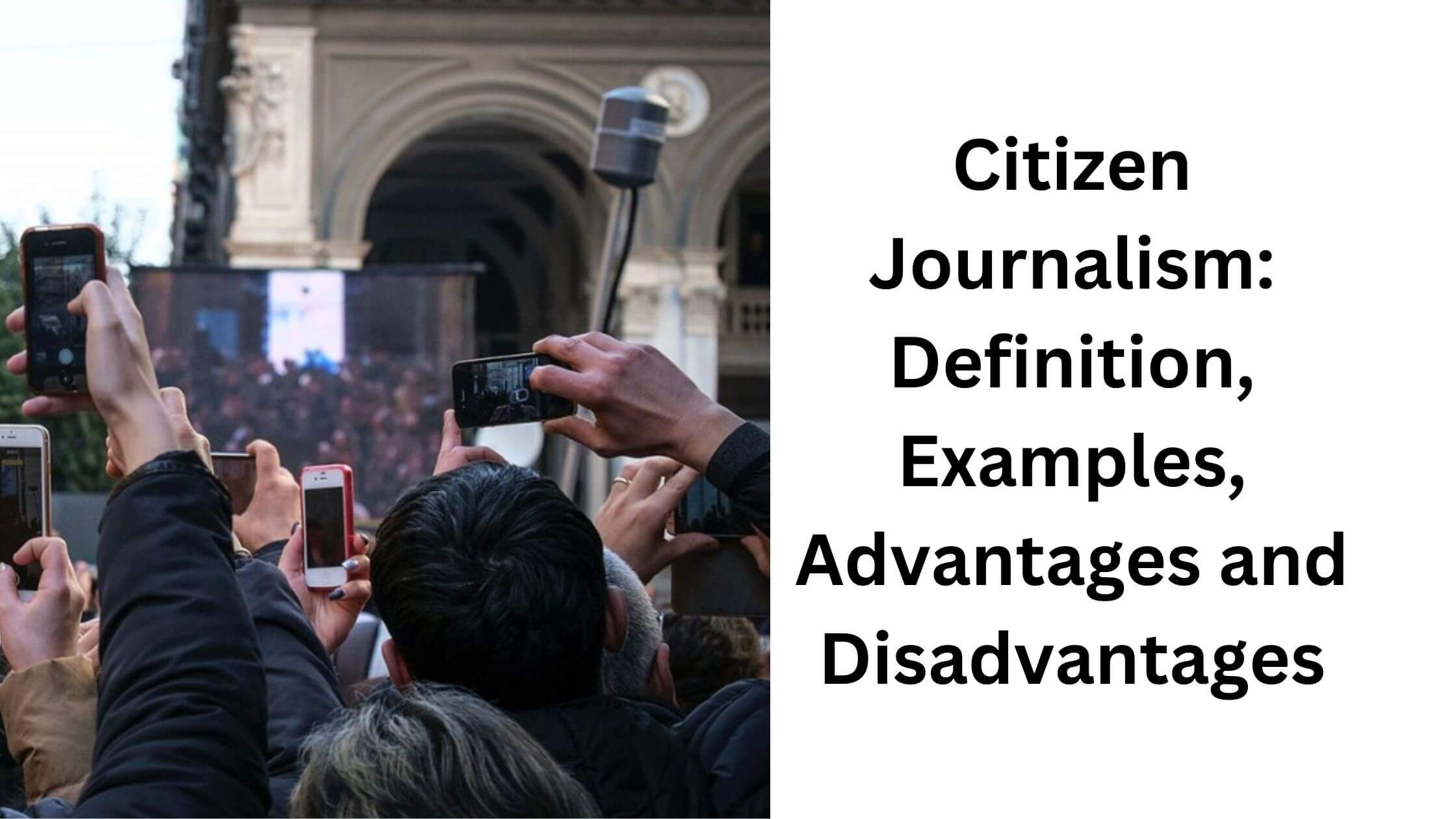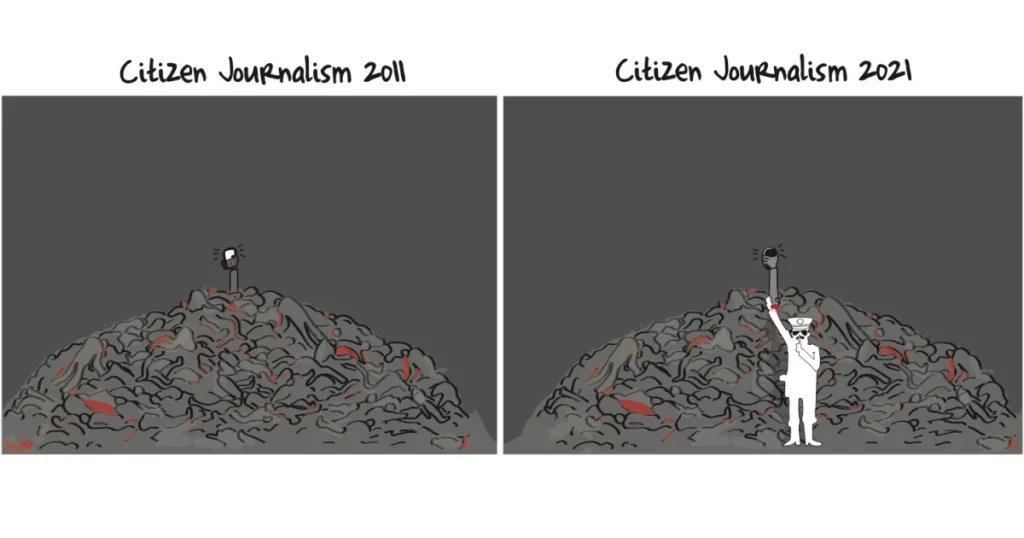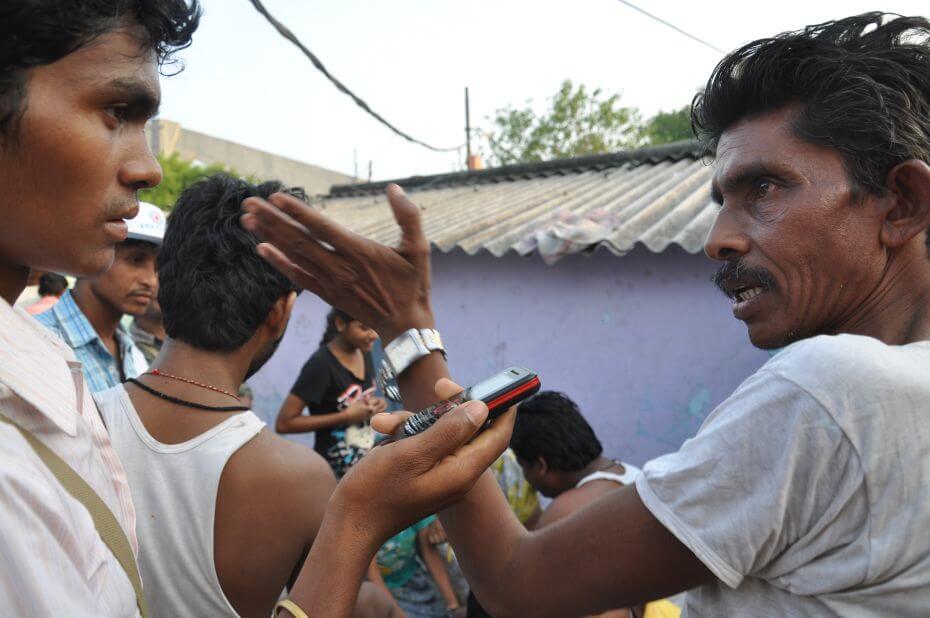Key Points
- Citizen journalism is the practice of ordinary people collecting, reporting, analyzing, and disseminating news and information.
- It is also known as collaborative media, participatory journalism, democratic journalism, guerrilla journalism, or street journalism.
- Citizen journalism is made possible by the development of online internet platforms, such as social networking and media-sharing websites.
- It has had a profound political impact, with citizens often reporting breaking news more quickly than traditional media reporters.
- Some examples of citizen journalism reporting include the 2010 Haiti earthquake, the Arab Spring, the Occupy Wall Street movement, the 2013 protests in Turkey, the Euromaidan events in Ukraine, and the Syrian Civil War.
- Critics of citizen journalism claim that it is unregulated, amateur, and haphazard in quality and coverage.
- Citizen journalists also lack the resources and focus on how best to serve the public that professional journalists have.
Contents
- 1 What is Citizen Journalism?
- 2 What is the Work of a Citizen Journalist?
- 3 Why is Citizen Journalism Important?
- 4 Citizen Journalism Examples
- 5 What is the History of Citizen Journalism?
- 6
- 7 What are the Advantages of Citizen Journalism?
- 8 What are the Disadvantages of Citizen Journalism?
- 8.1 Frequently Asked Questions About Citizen Journalism
- 8.1.1 What is the concept of citizen journalism?
- 8.1.2 Who introduced citizen journalism?
- 8.1.3 How is citizen journalism good?
- 8.1.4 What is the differences between citizen journalism and social journalism?
- 8.1.5 What prompted citizen journalism?
- 8.1.6 What are the advantages of citizen journalism brainly?
- 8.1.7 What is the purpose of citizen journalism quizlet?
- 8.1.8 What are drawbacks of citizen journalism quizlet?
- 8.1.9 What must a citizen journalist be equipped with?
- 8.1.10 What is the value of community journalism?
- 8.1.11 What do you think a citizen journalist is?
- 8.1.12 Which of the following is a negative aspect of citizen journalism?
- 8.1.13 What advantage do citizen journalists have over professional journalists?
- 8.1 Frequently Asked Questions About Citizen Journalism
What is Citizen Journalism?
Citizen journalism is the practice of ordinary people gathering and reporting news and information, often using digital tools like social media, blogs, and online platforms. It’s a way for people to share their experiences and perspectives on events happening around them, without relying on traditional media outlets.
Citizen journalism is also known as collaborative media, participatory journalism, democratic journalism, guerrilla journalism or street journalism.
Here are some key characteristics of citizen journalism:
- It’s done by non-professionals: Citizen journalists are not typically trained journalists, but they may have a passion for storytelling and a desire to share information with the public.
- It uses digital tools: The rise of the internet and social media has made it easier than ever for people to share news and information with a wide audience. Citizen journalists often use platforms like Twitter, Facebook, YouTube, and Instagram to reach their readers.
- It can be raw and unfiltered: Citizen journalism can provide a unique perspective on events, as it is often unfiltered by the gatekeepers of traditional media. This can be both a strength and a weakness, as it means that citizen journalists may not always fact-check their information or follow journalistic ethics.
- It can be a powerful tool for social change: Citizen journalism has been used to document human rights abuses, expose corruption, and give voice to marginalized communities. It can be a powerful tool for holding those in power accountable and for shaping public opinion.
What is the Work of a Citizen Journalist?
The days of relying just on big media channels and professional journalists for news are long gone. The emergence of citizen journalism has given regular people the ability to tell stories, recording events as they happen and offering their viewpoints to a global audience. Citizen journalists are frequently in the forefront of reporting on undercovered subjects and bringing diverse views to the table because they are not constrained by traditional gatekeepers and editorial norms.
How does it work?
Unlike their professional counterparts, citizen journalists rely on readily available tools like smartphones and social media platforms. They can:
- Capture breaking news: From protests and weather events to local injustices, citizen journalists are often the first responders, documenting developments in real-time.
- Share unique perspectives: Citizen journalists bring personal experiences and diverse viewpoints to the table, often providing valuable insights that traditional media might miss.
- Hold power accountable: Through social media and independent blogging, citizen journalists can expose wrongdoing and question authority, giving voice to marginalized communities.
Two main approaches:
Solo Citizen Journalist:
- Independent storytellers: These citizen journalists choose their own stories, free from editorial restraints and accountable primarily to their audience.
- Sharing through social media: Platforms like Twitter, Facebook, and YouTube become their publishing tools, allowing them to reach a global audience instantly.
- Building blogs and websites: Some solo citizen journalists establish their own online platforms to publish in-depth articles and investigations.
Citizen Journalist in Collaboration:
- Contributing to media organizations: Media outlets often rely on citizen-generated content, especially photos and videos from live events, when access is limited or risky for professional journalists.
- Crowdsourcing and data analysis: Citizen journalists can participate in online projects, sifting through data and providing valuable insights to support professional reporting.
Impact and Challenges:
Citizen journalism has undoubtedly democratized news and information access. However, it’s important to acknowledge challenges like:
- Verification and accuracy: With anyone able to publish information, concerns around misinformation and lack of fact-checking are crucial.
- Safety and ethics: Citizen journalists operating in sensitive environments face potential risks, and ethical considerations about privacy and responsible reporting are paramount.
Why is Citizen Journalism Important?
Information dissemination has been transformed by the internet, going from a steady trickle to a firehose. The days of waiting for newspapers or evening newscasts are long gone because information is instantly available on our screens. But this isn’t just about speed; it’s also about tearing down boundaries. The internet has turned into a platform where anybody can become a newsbreaker, a storyteller, or a citizen journalist without the help of conventional “gatekeepers.”
- Bypassing the Gatekeepers:
In the past, journalists served as gatekeepers, selecting which stories were revealed to the general public. This frequently meant that unpalatable facts or voices from the margins were left out. Anyone may share their experiences, opinions, and tales thanks to citizen journalism, which opens doors. A citizen journalist can instantaneously, uncensoredly, reach a worldwide audience by posting a video of a demonstration unfolding on social media or their own site.
- Immediate Impact in a Fast-Moving World:
When compared to the real-time pace of events, traditional media, with its editing procedures and fact-checking, can occasionally appear slow. However, promptness counts. Consider a natural catastrophe breaking news story. Before official reports surface, a citizen journalist’s tweet with images of the situation can provide crucial information about the magnitude of the damage and possible casualties.
- Reclaiming the Narrative:
People are given the opportunity to reclaim narrative control through citizen journalism. Citizen journalists can now challenge the status quo by bringing attention to topics not covered by the mainstream media, giving voice to underrepresented groups, and holding those in positions of authority responsible. They can provide varied viewpoints and refute existing narratives, enhancing public conversation and promoting an informed public.
- Participatory Power:
As opposed to traditional media, which is one-way, citizen journalism is participatory by nature. With cellphones and social media sites at their disposal, everyone can become a reporter, documentarian, or storyteller. In addition to democratising knowledge, this participatory approach promotes a feeling of shared responsibility and community. We are now more than simply viewers; we are actively involved in telling the important tales.
Of course, citizen journalism has its challenges, with issues like verification and ethical considerations needing careful attention. Yet, its potential to democratize information, empower individuals, and offer diverse perspectives on the world around us is undeniable. Citizen journalism is here to stay, and its voice is only growing louder.
Citizen Journalism Examples
Citizen journalism has become a powerful force in the modern media landscape, offering real-time insights, diverse perspectives, and unfiltered accounts that often go unreported by traditional media. Here are some compelling examples demonstrating the impact of citizen journalists across various issues:
- Arab Spring Uprisings (2010-2012)
- Ferguson Protests (2014)
- Catastrophic Events
- Armed Conflicts
- Environmental Issues
- Political Protests
- Community Reporting
- Social Issues
- Whistleblower Reports
- Blogging and Opinion Pieces
- Arab Spring Uprisings (2010-2012):

Citizen Journalism and Arab Spring. Image Credit: Al Jazeera - Social media platforms like Twitter, Facebook, and YouTube became vital tools for citizens to share immediate updates, videos, and images of protests, government crackdowns, and human rights violations during the Arab Spring uprisings. This played a crucial role in raising global awareness, sparking international debate, and amplifying the voices of those seeking democratic reforms.
- Ferguson Protests (2014):

Ferguson Protests and Citizen Journalism - Following the shooting of Michael Brown, citizen journalists on the ground documented the protests, police response, and community reactions through social media. This firsthand perspective helped expose the realities of police brutality and racial injustice, fueling national conversations and sparking activism.
- Catastrophic Events:
- During natural disasters and emergencies, citizen journalists often become the first responders, using their smartphones to share immediate updates and visuals. For instance, citizen reports with images and videos of the 2010 Haiti earthquake and the 2011 Tōhoku earthquake and tsunami in Japan provided critical information and fueled rescue efforts.
- Armed Conflicts:

Mohammad Bash/Shutterstock - In war zones like Syria and Ukraine, where traditional media faces access and safety limitations, citizen journalists have provided invaluable insights and footage from the frontlines. These firsthand accounts have exposed human rights abuses, documented war crimes, and offered essential perspectives on the realities of conflict.
- Environmental Issues:

- Citizen journalists play a crucial role in raising awareness about environmental concerns. For instance, individuals living near the Dakota Access Pipeline protests used social media to share images and videos, highlighting the potential environmental and cultural impact of the project.
- Political Protests:

Citizen Journalism During Egyptian Revolution. Image Credit: Al Jazeera - Citizen journalists frequently document and report on political protests and movements, offering alternative narratives and amplifying voices often ignored by mainstream media. The Umbrella Movement in Hong Kong relied heavily on social media and livestreaming to share updates about their protests advocating for greater democratic rights.
- Community Reporting:

A Citizen Journalist Interviewing a Local Resident in India. Image Credit: CNN - Citizen journalism thrives on local stories and community issues that traditional media might overlook. This includes reporting on local government actions, neighborhood events, and grassroots initiatives, giving a platform to everyday experiences and concerns often unheard in national news cycles.
- Social Issues:
- Citizen journalists often shine a light on social issues like discrimination, inequality, and injustice. Videos and posts about incidents of racial profiling, LGBTQ+ rights violations, and gender inequality have gained widespread attention through citizen journalism, sparking conversations and pushing for social change.
- Whistleblower Reports:
- Citizen journalism platforms can provide anonymity and security for individuals wanting to expose corruption, wrongdoing, or unethical behavior. Whistleblowers can share stories, documents, and evidence through blogs, secure messaging platforms, and other online tools, holding powerful entities accountable and sparking investigations.
- Blogging and Opinion Pieces:
- Beyond immediate news events, citizen journalism encompasses blogs, opinion pieces, and personal narratives that offer diverse perspectives on various topics. From cultural critiques to lifestyle insights and personal experiences, citizen journalists contribute to richer discourse and provide essential alternative viewpoints on the world around us.
These examples showcase the diverse applications and profound impact of citizen journalism. By democratizing information, amplifying unheard voices, and offering unfiltered perspectives, citizen journalists have become increasingly crucial players in our global media landscape.
Remember, these are just a few examples, and the world of citizen journalism is constantly evolving. As technology advances and social media platforms continue to grow, we can expect even more powerful and impactful stories to emerge from everyday
What is the History of Citizen Journalism?
Citizen journalism, the practice of ordinary people reporting news and information, has a fascinating history that stretches back centuries, with echoes in the present day. Let’s delve into its timeline:

Early Precursors (Pre-20th Century):
- 1690s: In the USA, Benjamin Harris’ “Publick Occurrences Both Forreign and Domestick” is considered one of the first newspapers, setting the stage for citizen involvement in news distribution.

- 18th-19th Centuries: Pamphlets, broadsides, and letters to the editor were common avenues for citizens to share information and participate in public discourse, shaping political and social movements.
20th Century Developments:
- 1960s-70s: Alternative media movements, spurred by civil rights and anti-war activism, challenged traditional media narratives and gave rise to independent citizen journalism initiatives.
- 1980s-90s: Civic journalism emerged, emphasizing audience participation and community focus in news reporting. Technologies like fax machines and camcorders empowered citizens to document events directly.

Image Credit:Wikipedia
Rise of the Digital Age (21st Century):
- Early 2000s: The internet boom saw the explosion of blogs and online forums, providing platforms for citizen journalists to share their stories and perspectives. OhmyNews in South Korea, a pioneering online citizen journalism platform, established itself as a major media voice.

- Mid-2000s onwards: Social media platforms like Twitter and YouTube revolutionized citizen journalism, enabling real-time reporting and widespread dissemination of information from individuals on the ground during major events like the Arab Spring and natural disasters.
Challenges and Ongoing Debates:
- Verification and accuracy: Concerns about factuality and bias remain persistent challenges in citizen journalism.
- Ethical considerations: Issues of privacy, safety, and potential manipulation by external forces require careful navigation by citizen journalists.
- Professional vs. citizen journalism: The relationship between traditional news media and citizen journalism continues to evolve, with collaboration and competition sometimes coexisting.
Impact and Significance:
Despite the challenges, citizen journalism has fundamentally changed the media landscape:
- Democratizing news production: It gives voice to marginalized communities and provides alternative perspectives often missing in mainstream media.
- Holding power accountable: Citizen journalists can expose injustices and spark social change through their independent reporting.
- Engaging the public: By allowing audiences to participate in news creation, citizen journalism fosters a more informed and engaged citizenry.
Citizen journalism’s history is one of constant evolution, shaped by technological advancements, social movements, and ongoing debates about the role of information in society. As technology continues to evolve and empower individuals, the future of citizen journalism remains exciting and full of potential for transforming how we understand and share the world around us.
Remember:
- Citizen journalism is about giving a voice to the unheard and bringing diverse perspectives to light.
- It empowers individuals to document their realities and hold power accountable.
- While technology plays a crucial role, the core of citizen journalism lies in courage, responsibility, and a commitment to truth.
Let’s continue to champion the spirit of citizen journalism and embrace its potential to create a more informed and empowered world.
What are the Advantages of Citizen Journalism?
Citizen journalism has emerged as a powerful force in the media landscape, offering unique advantages that traditional media often struggles to match. Here are some key reasons why citizen journalism matters:
- Holding Power Accountable:
One of the biggest advantages of citizen journalism is its ability to challenge the traditional narratives often controlled by established media or powerful interests. Unlike large corporations with complex agendas, citizen journalists don’t have gatekeepers dictating what gets reported. This allows them to pursue stories that traditional media might ignore, shed light on injustices, and hold those in power accountable. Unfiltered and often raw, citizen-generated content can expose wrongdoing, spark public discourse, and drive positive change.
- Democratizing Information:
Traditional media has long been criticized for its limitations in access, representation, and diversity. Citizen journalism disrupts this power imbalance by democratizing information. Anyone with a phone or internet connection can become a storyteller, sharing their experiences, perspectives, and stories from communities often unheard in mainstream media. This participatory nature amplifies marginalized voices, gives local issues a global platform, and creates a more inclusive media landscape.
- Breaking Through the Gatekeepers:
In the past, media gatekeepers controlled what information reached the public, often filtering out inconvenient truths or stories challenging the status quo. Citizen journalism bypasses these gatekeepers, allowing stories to emerge directly from the source and reach audiences instantly through online platforms. This immediacy and accessibility challenge the traditional media’s control over narratives and empowers individuals to share their realities without censorship.
- Fueling Transparency and Scrutiny:
Traditional media can sometimes get lost in the news cycle, overlooking crucial details or failing to provide in-depth analysis. Citizen journalists, due to their proximity to events and personal connection to issues, can offer valuable insights and bring greater scrutiny to complex stories. Their on-the-ground perspectives, firsthand accounts, and raw footage can expose inconsistencies, spark investigations, and push for greater transparency in public affairs.
- Fostering Community and Engagement:
Citizen journalism isn’t just about sharing information; it’s about building communities and sparking engagement. By sharing their stories, citizen journalists connect with individuals facing similar challenges, raise awareness about local issues, and mobilize communities for collective action. This participatory approach fosters a sense of shared responsibility, empowers individuals to become active participants in shaping their communities, and breaks down the traditional one-way flow of information.
These are just some of the advantages of citizen journalism. While it’s crucial to acknowledge potential challenges like accuracy verification and ethical considerations, it’s undeniable that citizen journalism is shaping the future of media. By giving voice to the unheard, empowering individuals, and challenging the status quo, citizen journalists are democratizing information, driving social change, and creating a more informed and engaged world.
Remember, the power of citizen journalism lies in its potential to disrupt traditional narratives, amplify marginalized voices, and hold power accountable. As technology continues to evolve and empower individuals, it’s clear that citizen journalism will continue to play a crucial role in shaping the future of information and communication.
What are the Disadvantages of Citizen Journalism?
- Verification and Accuracy:
The lack of gatekeepers and regulations in citizen journalism can indeed pose challenges in verifying facts and ensuring accuracy. Unlike professional journalists who adhere to established ethical codes and fact-checking protocols, citizen journalists might not have the same resources or training to verify information. This can lead to:
- Misinformation and disinformation: False or misleading information can spread quickly online, especially if presented with emotional appeal or sensationalized storytelling. This can fuel confusion, mistrust, and even harm.
- Biased reporting: Personal biases or agendas can influence how citizen journalists frame stories, potentially overlooking key information or presenting an incomplete picture.
- Errors and inaccuracies: Without proper fact-checking, factual errors can easily make their way into citizen-generated content, further undermining its credibility.
- Ethical Considerations:
Beyond factual accuracy, ethical considerations are crucial in responsible citizen journalism. Some potential pitfalls include:
- Privacy violations: Capturing video or photographs without consent, especially in sensitive situations, can raise privacy concerns and ethical dilemmas.
- Sensationalism and exploitation: Focusing solely on sensational aspects of a story to garner attention can exploit individuals or trivialize serious issues.
- Lack of context and balance: Presenting information without proper context or neglecting diverse perspectives can lead to incomplete or misleading narratives.
Mitigating the Challenges:
While these challenges exist, it’s important to remember that responsible citizen journalism is possible. Here are some ways to mitigate these risks:
- Fact-checking resources: Encourage using credible sources, cross-referencing information, and being transparent about limitations in verifying certain claims.
- Ethical guidelines: Promote awareness of ethical principles like accuracy, objectivity, and fairness in reporting.
- Training and workshops: Educate citizen journalists on responsible reporting practices, including fact-checking techniques, interview skills, and ethical considerations.
- Community moderation: Utilize community-based moderation tools to flag potentially misleading or harmful content and encourage responsible communication.
By acknowledging the challenges and actively promoting responsible practices, we can empower citizen journalists to contribute valuable and credible information to the public discourse. Remember, ethical and accurate citizen journalism can play a vital role in informing and engaging communities, holding power accountable, and driving positive change.
It’s important to strike a balance between acknowledging the challenges and celebrating the potential of citizen journalism. Let’s work together to foster a responsible and impactful citizen journalism movement that contributes to a more informed and empowered world.
Frequently Asked Questions About Citizen Journalism
What is the concept of citizen journalism?
Citizen journalism is the term for reporting done by non-professional journalists who use social media, blogs, and websites to share information.
Who introduced citizen journalism?
In South Korea, where internet entrepreneur Oh Yeon-ho declared in 2000 that “every citizen is a reporter,” the phrase and its application came to be. Oh claimed that he and three other South Korean coworkers were unhappy with the country’s traditional press and that’s why they launched an online daily newspaper in 2000.
How is citizen journalism good?
By offering alternative information, citizen journalism has been found to free common people from government propaganda, especially in authoritarian settings where censorship is frequently enforced.
- Civic journalism: Practiced by professional journalists. They work within traditional media outlets but adopt a different approach to reporting.
- Citizen journalism: Practiced by ordinary people with no formal journalism training. They use social media, blogs, and independent websites to share information and perspectives.
What prompted citizen journalism?
As reporters started to doubt how reliably they were covering events like the 1988 US presidential election, the modern citizen journalism movement was born.
What are the advantages of citizen journalism brainly?
In addition to real-time photos and videos, citizen journalists can contribute written reports to the news industry. Events that the mainstream media might otherwise overlook can be covered by it. It is possible to obtain news without it being influenced or dominated by political parties or other organisations.
What is the purpose of citizen journalism quizlet?
Through citizen journalism, the voice of the people may be heard and valued, fostering strong communal ties.
What are drawbacks of citizen journalism quizlet?
Citizen journalists lack resources for investigative reporting.
It may produce inaccurate information.
What must a citizen journalist be equipped with?
What is the value of community journalism?
Community journalism is a sincere attempt to rebuild journalism’s former standing and return the press to its original function as a forum for the exchange of ideas and viewpoints. Community newspapers, at their best, use their publications to affirm a feeling of community.
What do you think a citizen journalist is?
Those who utilise digital media to report on events and problems they care about are known as citizen journalists. Although they do not work as journalists for a living, they can nevertheless be very useful in keeping authorities and other organisations responsible. Being a citizen journalist does not require any specific training.
Which of the following is a negative aspect of citizen journalism?
One of the key disadvantages of citizen journalism is the lack of professional training and journalistic standards.
What advantage do citizen journalists have over professional journalists?
As events unfold, citizens can record and report on them, frequently offering firsthand, on-the-ground information that traditional journalists might not have.
Further Reading:













